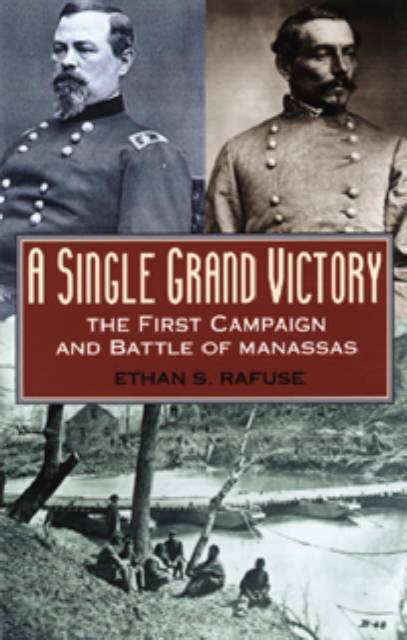
- Retrait gratuit dans votre magasin Club
- 7.000.000 titres dans notre catalogue
- Payer en toute sécurité
- Toujours un magasin près de chez vous
- Retrait gratuit dans votre magasin Club
- 7.000.0000 titres dans notre catalogue
- Payer en toute sécurité
- Toujours un magasin près de chez vous
A Single Grand Victory
The First Campaign and Battle of Manassas
Ethan S RafuseDescription
A Single Grand Victory is a highly readable, concise, comprehensive narrative by Ethan S. Rafuse, professor of history at the United States Military Academy at West Point. Rafuse worked as a park ranger at Bull Run, where he gained great familiarity with the site and the literature on this battle. His new book incorporates insights offered in recent scholarship on Civil War military, political, and cultural history.
The author describes the factors that led President Abraham Lincoln to order an offensive against Confederates at Manassas Junction at a time when his most prominent military men advised against it. The war policies of both the Union and Confederate sides are explained. Rafuse offers descriptions and analysis of the individuals involved and the circumstances that influenced the manner in which the campaign was conducted. He covers the critical events and operational and tactical decisions that shaped the campaign's course and outcome.In addition, A Single Grand Victory provides insights into American life in the nineteenth century by examining what motivated men to fight in 1861 and describing what led both North and South to expect the war would be a short one. Southerners had anticipated that one victory like Bull Run would persuade the North to abandon the effort to restore the Union by force. Northerners believed support for the Confederate rebellion was so shallow that one battle would end the war.
Civil War buffs will enjoy thisSpécifications
Parties prenantes
- Auteur(s) :
- Editeur:
Contenu
- Nombre de pages :
- 226
- Langue:
- Anglais
Caractéristiques
- EAN:
- 9780842028769
- Date de parution :
- 01-04-02
- Format:
- Livre broché
- Format numérique:
- Trade paperback (VS)
- Dimensions :
- 144 mm x 218 mm
- Poids :
- 349 g

Les avis
Nous publions uniquement les avis qui respectent les conditions requises. Consultez nos conditions pour les avis.






